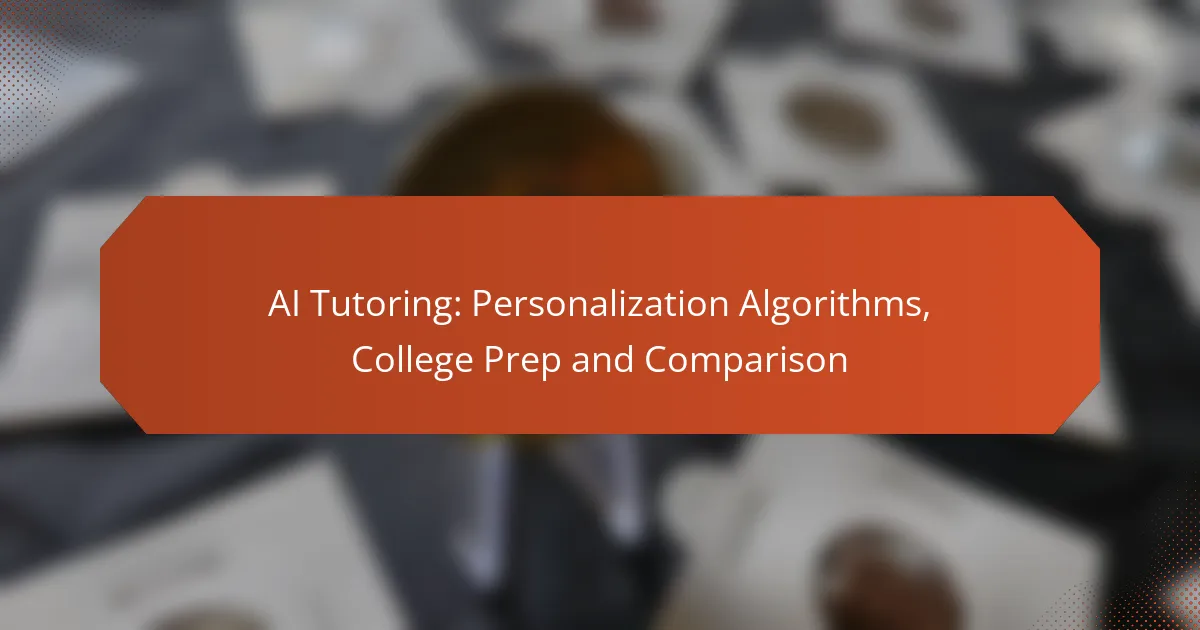AI tutoring leverages advanced algorithms to create personalized learning experiences that cater to each student’s unique needs and preferences. By adapting content and tracking progress, these platforms enhance engagement and effectiveness, particularly in preparation for college entrance exams. This tailored approach ensures that students receive the targeted support necessary to excel academically.
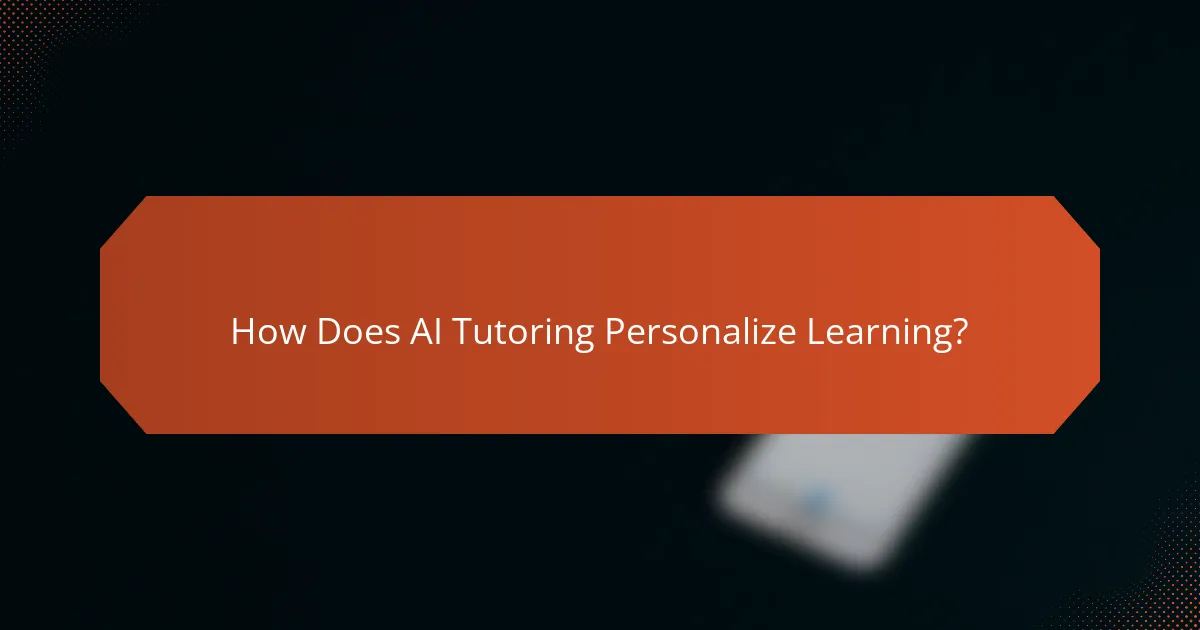
How Does AI Tutoring Personalize Learning?
AI tutoring personalizes learning by utilizing algorithms that adapt to individual student needs, preferences, and performance. This tailored approach enhances engagement and effectiveness, making learning more efficient and relevant for each user.
Adaptive learning algorithms
Adaptive learning algorithms adjust the content and pace of instruction based on a student’s performance and engagement levels. These algorithms analyze data from previous interactions to identify strengths and weaknesses, allowing for a customized learning path. For instance, if a student struggles with algebra, the system may provide additional practice problems and resources in that area.
Data-driven insights
Data-driven insights are generated from the vast amounts of information collected during a student’s learning journey. This includes tracking progress, understanding learning habits, and identifying areas needing improvement. By leveraging these insights, AI tutoring systems can recommend specific resources or strategies tailored to the student’s unique profile.
Real-time feedback mechanisms
Real-time feedback mechanisms provide immediate responses to student actions, enhancing the learning experience. For example, when a student answers a question incorrectly, the system can instantly offer hints or explanations, helping them understand their mistakes. This instant feedback loop fosters a more engaging and supportive learning environment.
Learning style assessments
Learning style assessments help identify how a student best absorbs information, whether through visual, auditory, or kinesthetic methods. By understanding these preferences, AI tutoring can present material in a way that resonates with the student, increasing retention and comprehension. For example, a visual learner might benefit from diagrams and videos, while an auditory learner may prefer podcasts or discussions.
Customizable lesson plans
Customizable lesson plans allow educators and students to tailor the curriculum to fit specific goals and timelines. AI tutoring platforms often offer templates that can be adjusted based on the student’s progress and interests. This flexibility ensures that the learning experience remains relevant and aligned with the student’s academic objectives, whether preparing for college entrance exams or mastering a particular subject area.
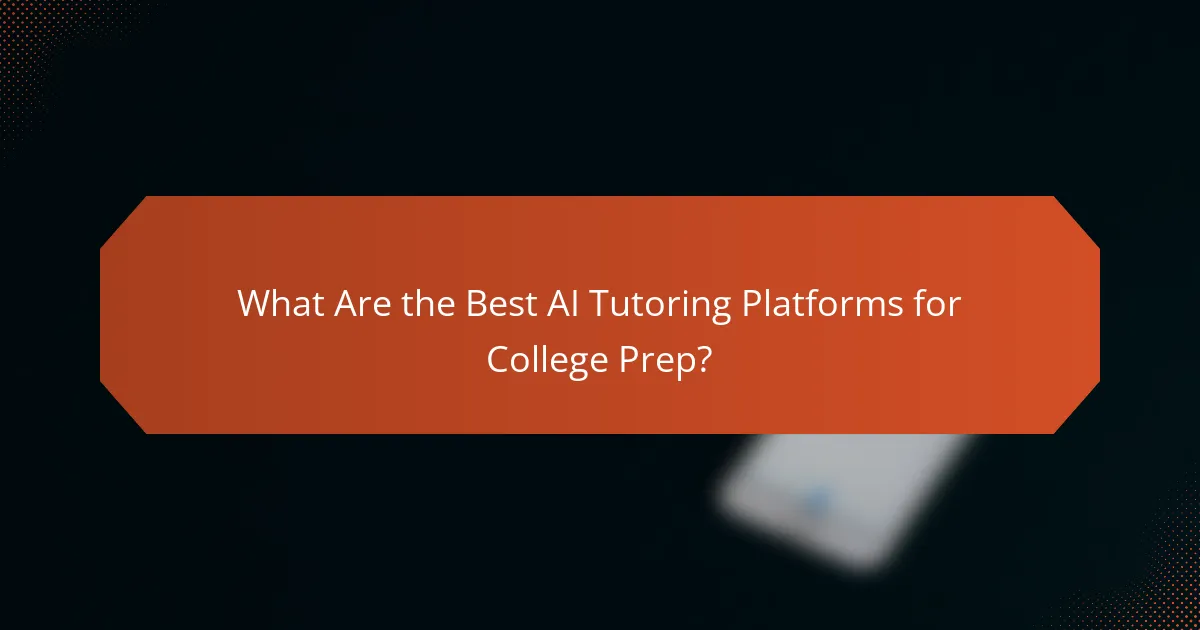
What Are the Best AI Tutoring Platforms for College Prep?
The best AI tutoring platforms for college preparation offer personalized learning experiences tailored to individual student needs. These platforms utilize advanced algorithms to adapt content, track progress, and provide targeted support in various subjects, ensuring students are well-prepared for college entrance exams and academic challenges.
Khan Academy
Khan Academy is a free online resource that provides a comprehensive range of courses, including math, science, and humanities. Its AI-driven system personalizes learning paths based on student performance, allowing users to focus on areas needing improvement.
The platform includes practice exercises and instructional videos, making it suitable for self-paced learning. Students can track their progress and receive recommendations for further study, which is particularly useful for SAT or ACT preparation.
Coursera
Coursera partners with universities to offer courses that can enhance college readiness. While many courses are free, obtaining a certificate typically requires a fee. The platform uses machine learning to suggest courses based on user interests and previous enrollments.
Students can access a variety of subjects, including advanced math and critical thinking skills, which are essential for college success. Coursera’s flexibility allows learners to study at their own pace, making it a valuable tool for busy students preparing for college.
Chegg Tutors
Chegg Tutors connects students with live tutors for personalized help in various subjects. The platform uses algorithms to match students with tutors based on their specific needs and learning styles, ensuring effective support.
Sessions can be scheduled on-demand, providing immediate assistance when needed. Chegg also offers resources like textbook solutions and study guides, making it a comprehensive tool for college prep.
Wyzant
Wyzant is a tutoring platform that allows students to find and connect with local or online tutors across numerous subjects. The platform’s matching system considers student preferences, ensuring a good fit between tutors and learners.
Wyzant offers flexible scheduling and pricing options, allowing students to choose tutors based on their budget and availability. This adaptability makes it an excellent choice for personalized college preparation support.
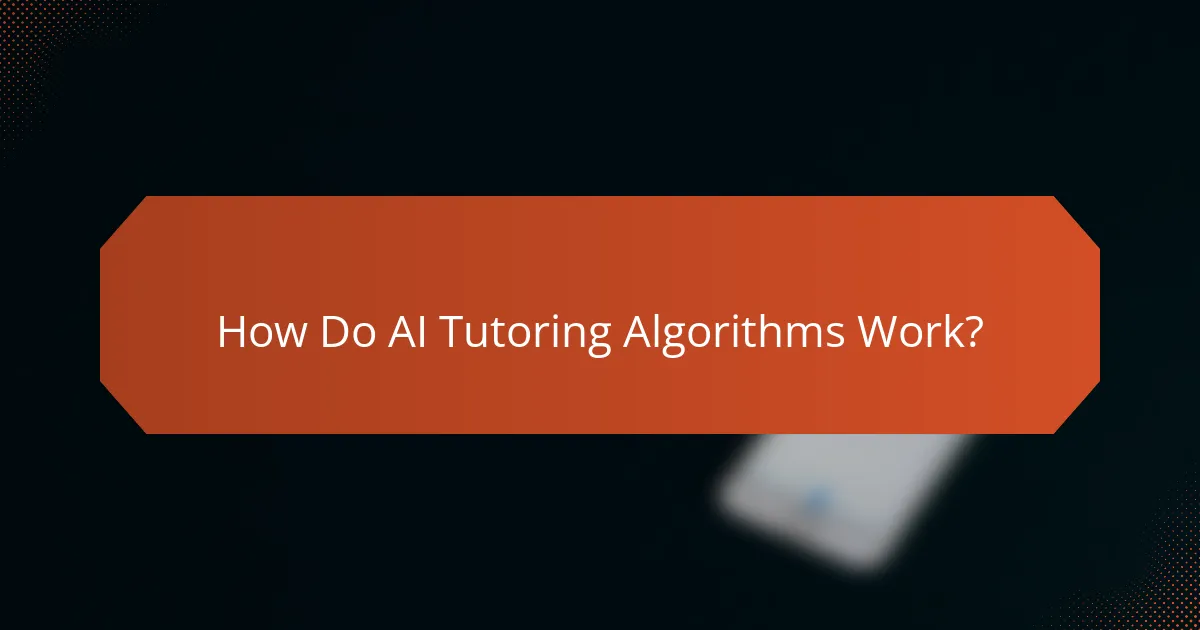
How Do AI Tutoring Algorithms Work?
AI tutoring algorithms leverage advanced technologies to personalize learning experiences for students. They analyze individual performance and preferences to tailor educational content, enhancing engagement and effectiveness.
Machine learning techniques
Machine learning techniques are fundamental to AI tutoring algorithms, enabling them to learn from data and improve over time. These algorithms can identify patterns in student behavior, such as common mistakes or preferred learning styles, allowing for customized feedback and resources.
Common machine learning methods used in AI tutoring include supervised learning, where models are trained on labeled data, and reinforcement learning, which optimizes actions based on rewards. For instance, an AI tutor might adjust its teaching strategy based on a student’s response history, providing more practice in challenging areas.
Natural language processing
Natural language processing (NLP) allows AI tutoring systems to understand and respond to student inquiries in a conversational manner. This capability enhances interaction, making learning feel more intuitive and engaging.
NLP techniques can analyze student questions, providing relevant answers or resources. For example, if a student asks for help with a math problem, the AI can interpret the question and offer step-by-step guidance or similar practice problems.
Predictive analytics
Predictive analytics in AI tutoring involves using historical data to forecast future student performance and needs. By analyzing trends, these algorithms can proactively suggest resources or interventions before a student falls behind.
For instance, if data shows that a student struggles with specific topics, the AI can recommend targeted exercises or additional reading materials. This proactive approach helps ensure that students receive the support they need in a timely manner, improving overall academic outcomes.
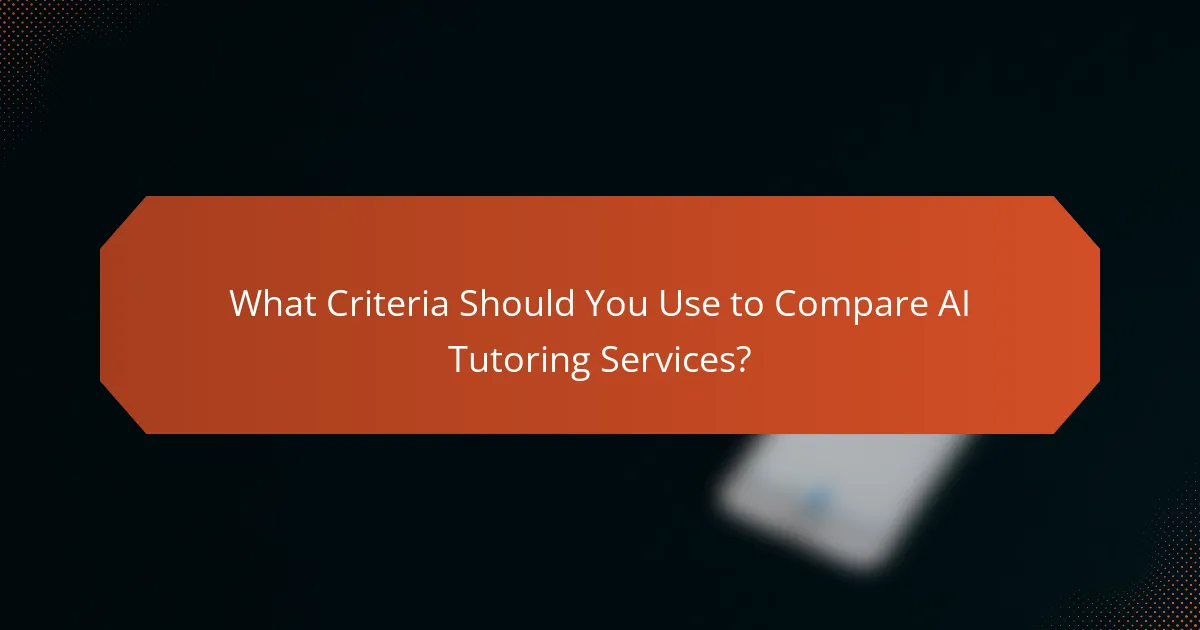
What Criteria Should You Use to Compare AI Tutoring Services?
When comparing AI tutoring services, consider factors such as cost-effectiveness, user experience, subject coverage, and success rates. These criteria will help you evaluate which service best meets your educational needs and budget.
Cost-effectiveness
Cost-effectiveness refers to the value you receive for the price you pay for AI tutoring services. Look for platforms that offer flexible pricing models, such as pay-per-session or subscription plans, which can range from $20 to $100 per month depending on the service.
Compare the features included in each pricing tier, such as personalized lesson plans or access to additional resources. Some services may offer free trials or money-back guarantees, allowing you to assess their value without a significant financial commitment.
User experience
User experience encompasses the ease of navigation, interface design, and overall satisfaction with the tutoring platform. A well-designed platform should be intuitive and accessible, allowing students to focus on learning rather than struggling with technology.
Consider reading reviews or trying demos to gauge the user experience. Look for features like interactive tools, responsive customer support, and mobile compatibility, which can enhance the learning process.
Subject coverage
Subject coverage indicates the range of topics and courses available through the AI tutoring service. Ensure that the platform offers assistance in the specific subjects you need, whether it’s math, science, language arts, or test preparation.
Some services specialize in certain areas, while others provide a broad curriculum. Check if they offer resources for standardized tests like the SAT or ACT, as this can be crucial for college preparation.
Success rates
Success rates reflect the effectiveness of the tutoring service in improving student performance. Look for data or testimonials that demonstrate how well students have fared after using the service, such as improvements in grades or test scores.
Many platforms will share success stories or statistics, but be cautious of overly optimistic claims. Aim for services that provide transparent metrics and real user feedback to ensure you are making an informed decision.
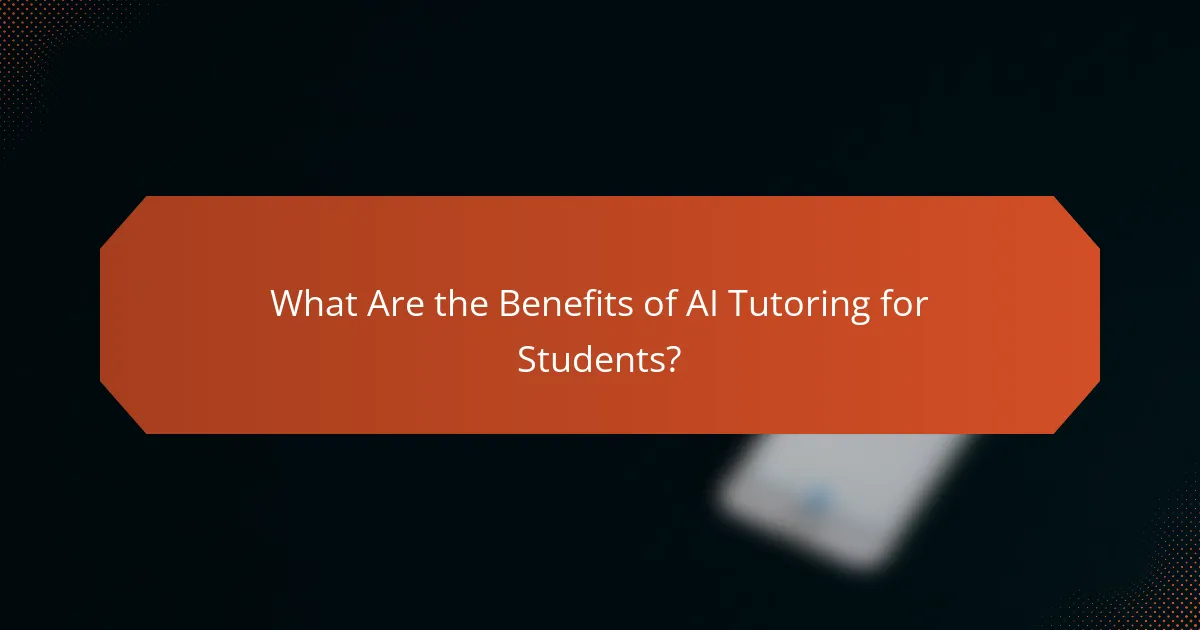
What Are the Benefits of AI Tutoring for Students?
AI tutoring offers personalized learning experiences that adapt to each student’s unique needs, enhancing understanding and retention. By utilizing algorithms that analyze performance, these systems provide targeted support, making study time more efficient and effective.
Personalization Algorithms
Personalization algorithms in AI tutoring systems tailor educational content to fit individual learning styles and paces. These algorithms assess a student’s strengths and weaknesses through ongoing assessments, adjusting the difficulty and type of material presented accordingly.
For example, if a student struggles with algebra, the AI can provide additional practice problems and explanations specifically focused on that area. This targeted approach helps students grasp concepts more thoroughly and encourages mastery before moving on to more complex topics.
College Prep
AI tutoring can significantly enhance college preparation by offering customized study plans and resources tailored to specific college entrance exams like the SAT or ACT. These systems often include practice tests, feedback on performance, and strategies for improvement.
Students can benefit from simulated testing environments that mimic actual exam conditions, helping to reduce anxiety and improve time management skills. Additionally, AI can suggest study schedules that fit within a student’s existing commitments, ensuring a balanced approach to preparation.
Comparison with Traditional Tutoring
Compared to traditional tutoring, AI tutoring provides several advantages, including accessibility and scalability. Students can access AI tutors anytime and anywhere, making it easier to fit learning into busy schedules.
While traditional tutors offer personalized interaction, AI systems can analyze vast amounts of data to identify patterns and suggest improvements more quickly. However, students should consider the value of human interaction, especially for complex subjects where nuanced understanding is crucial.
